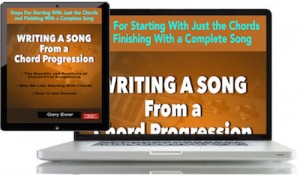In everything you do, there is the theoretical side and the practical side. Theory refers to the intellectual understanding of a topic – the studying. Practice refers to actually doing what you’re studying about.
In the fine arts, including the performing and/or writing music, theory refers to the nuts and bolts of what makes music sound the way it does. So theory means studying scales, rhythms, time signatures, chords, keys, transposition, and more.
 Do you find that writing a great melody is your biggest challenge? In great songs, it’s not just about the tune — Melodies are great when they partner well with lyrics and chords. Learn more about that important partnership in “The Essential Secrets of Songwriting.” $27, but get it at a huge discount when you buy the 10-eBook Bundle.
Do you find that writing a great melody is your biggest challenge? In great songs, it’s not just about the tune — Melodies are great when they partner well with lyrics and chords. Learn more about that important partnership in “The Essential Secrets of Songwriting.” $27, but get it at a huge discount when you buy the 10-eBook Bundle.
A songwriter typically concentrates on (and usually most values) the practical side. Most songwriters have at least some understanding of the theory behind what they do, but to them, songwriting means doing, not studying.
I think that sounds about right. I firmly believe that songwriters improve with some understanding of music theory, but the best advancements will be made by knowing how to put that theory to use.
But if you’re looking to improve your understanding of the theory that guides and informs songwriting, what do you study? Here’s a list that pretty much covers it:
- Rudiments: studying the elements of music: scales, rhythms, time signatures, etc.
- History: digging down into music’s past — the fossil record, so to speak — and discovering why today’s music sounds the way it does.
- Instrumental practicing: Yes, practicing your instrument can be a contributor to theory, in the sense that it helps to generate songwriting ideas that might appear in something you’re working on.
- Ear Training: Learning about how to identify the musical sounds you hear in music.
- Songwriting exercises. A songwriting exercise is any writing activity where the main purpose is to learn, reinforce and hone a technical feature meant to improve your songwriting process.
Theory or Practice?
Most songwriters are already doing at least something on that list, but it begs the question: What’s most important, theory or practice? Studying or doing?
The answer, you might guess, is that the best songwriters exhibit a balance between both sides of the picture.
Songwriters always benefit from actually writing. But with no rudiments, no knowledge of the history of their chosen genre, no practical skills on an instrument, no aural skills (i.e., no ear training ability), and no attempt to practice songwriting through specifically directed exercises, the songs will be limited in scope and imagination.
Most songwriters will find the theoretical side to be frustrating, boring, or of no practical use. It takes a strong sense of discipline to make it work for you.
When all is said and done, I can tell you this: songwriters that try to improve their understanding of the theory of songwriting will eventually reap the benefits in the practical side. Any songwriter should consider studying to be a crucial part of longterm improvement of songwriting skills.
 Written by Gary Ewer. Follow Gary on Twitter.
Written by Gary Ewer. Follow Gary on Twitter.
 If you like starting songs by working out a good chord progression, you need to get “Writing a Song From a Chord Progression.” It shows you the strengths and pitfalls of this very common songwriting process.
If you like starting songs by working out a good chord progression, you need to get “Writing a Song From a Chord Progression.” It shows you the strengths and pitfalls of this very common songwriting process.











Pingback: How to Improvise Your Next Song | The Essential Secrets of Songwriting